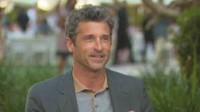 Actor Patrick Dempsey isn’t a doctor, but he played Dr. Derek “McDreamy” Shepherd on TV for so many years that he says people often get confused.
Actor Patrick Dempsey isn’t a doctor, but he played Dr. Derek “McDreamy” Shepherd on TV for so many years that he says people often get confused.
The mix-up can become especially pronounced when he heads home to Lewiston, Maine and visits the Dempsey Center, a complementary cancer care center that he founded in 2008, just over a decade after his mother was first diagnosed with ovarian cancer. Local patients and their families can visit for fitness, nutrition classes, counseling — all free of cost.
“Every person has a different need,” Dempsey said, speaking at The Atlantic’s People v Cancer conference in New York on Tuesday. “We do not treat the disease, we treat the person. We treat the whole person, the family, the caregivers, the children, everyone.”
Among the cancer patients, there is one favorite treatment that rises above the rest: acupuncture.
“I mean, everybody likes to get massage,” he said.
Acupuncture — a traditional Chinese needle, heat, and pressure system that has been around for thousands of years — has been shown to relieve some of the most painful and stomach-churning side effects of cancer treatments. But while many people do feel better after an acupuncture treatment, scientists have evidence that a lot of what’s going on is a placebo effect.

Acupuncture can help cancer patients feel better, but it may not be because of the needles
Acupuncture relies on tapping specific points on the body, called “acupoints.” The idea is that acupuncture can influence the body’s “qi” or “chi,” aka energy. Typically, treatment is done with needles that are almost as thin as a human hair, but some acupuncturists might also use heat or apply pressure.
The tradition piqued the interest of the US National Institutes of Health, where scientists started studying acupuncture in 1997. Turned out, the needling technique was effective at easing some of the nasty side effects of cancer radiation and chemotherapy, especially the nausea and severe vomiting. Acupuncture may also help patients with fatigue.
But scientists have also discovered that the benefits of acupuncture may have nothing to do with the needles or specific pressure points. Many studies which have pitted acupuncture against “sham” pricking treatments suggest there may be a powerful placebo effect at work.
“You could randomly poke somebody with toothpicks, and some studies literally do that, and that’s just as effective as doing all the things that an acupuncturist is supposed to do,” Dr Steven Novells, a neurologist at Yale, previously told Business Insider.
Whatever the mechanism, Dempsey said he sees notable changes when patients try acupuncture at his cancer center.
“It’s nice to see when people are hesitant at the beginning, and then they try it, and they’re a few sessions in, and they notice a difference,” he said. “Then they’re like, ‘Ahh, yeah.'”
The right kind of touch may be an important part of this equation. Virtually any good massage therapy can help treat pain and improve quality of life for cancer patients, needles included or not.
Perhaps that’s why Dempsey is such a vocal proponent of wellness centers like his, arguing they should be “in every hospital” and part of every cancer patient’s support.
“You need to be prepared physically, emotionally, and mentally for the journey,” he said. “The whole family does.”
